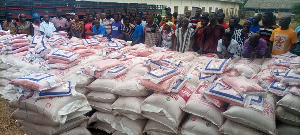 The selected farmers were provided with 5 kg of maize seeds
The selected farmers were provided with 5 kg of maize seeds
Some 137 farmers in the Abuakwa North Municipality of the Eastern Region have benefited from the distribution of farm inputs to boost their productivity.
The initiative forms a critical component of the government’s flagship Planting for Food and Jobs program, which was launched in 2017 to boost food production, generate employment, and reduce the nation's reliance on imported food.
The Municipal Assembly, through its agricultural department, with funding from the Ministry of Food and Agriculture, distributed the fertilizers and maize seeds to the farmers in the area.
The selected farmers, recognized for their dedication to farming and their need for additional resources to increase yields, received 100 kg of NPK fertilizer—a vital mix of nitrogen, phosphorus, and potassium essential for robust plant growth.
Additionally, each farmer was provided with 5 kg of maize seeds, a key
staple in Ghana's diet, aimed at further ensuring food security.
Alhaji Umar Baba Bodinga, the Municipal Chief Executive (MCE), who personally distributed the inputs to the farmers, stated that the package formed part of the government's efforts to assist farmers.
He encouraged the farmers to maximize the opportunity, emphasizing the government’s ongoing commitment to supporting the agricultural sector.
The MCE highlighted that the distribution is just one facet of a broader strategy under the Planting for Food and Jobs program, with the government offering access to extension services, improved seeds, and subsidized farm machinery, all aimed at empowering farmers and boosting agricultural output.
According to him, the implements would enable the farmers to produce more to increase their income, adding that the gesture was to boost agriculture in communities within the municipality.
The Assembly chief cautioned the beneficiaries against selling the farm inputs given to them but instead leveraged the items to their fullest advantage to maximize productivity.
The beneficiaries, in an interview, expressed their profound gratitude to the Assembly for supplying them with the inputs.
They expressed optimism that the resources would significantly enhance their productivity and livelihoods, assuring that they were committed to using the fertilizers and seeds wisely and sharing the knowledge gained from the initiative with their peers, fostering a stronger, more collaborative agricultural community.
The farmers also indicated that the inputs would go a long way toward helping them cultivate the crops, as previously, they could not afford to purchase such inputs.
They, however, appealed for more interventions from the government to address the additional needs of the farmers and urged the government to support them regularly by providing them with knapsack sprayers to spray their farms.
This is not the first time the Assembly has distributed inputs to farmers, with the impact of the interventions already evident in the municipality in noticeable increases in agricultural production and a reduction in food imports.
As the farming season progresses, the Abuakwa North Municipal Assembly
and the Ministry of Food and Agriculture will continue to provide monitoring and support to ensure a successful harvest.
This initiative underscores the government's dedication to promoting agriculture and achieving sustainable food security for the people of Ghana, marking a significant step towards self-sufficiency and economic resilience.